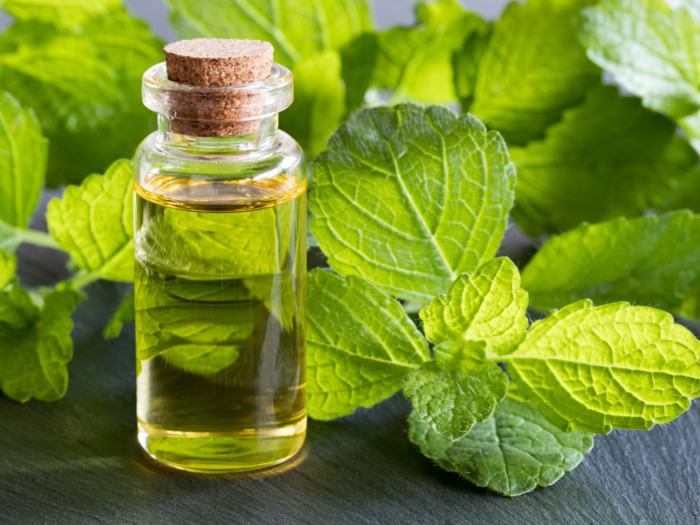The health benefits of melissa essential oil include the treatment of insomnia, hypertension, migraines, anxiety, herpes, dementia, and aromatherapy. These benefits can be attributed to its properties as an antidepressant, cordial, nervine, emmenagogue, sedative, antispasmodic, stomachic, antibacterial, carminative, diaphoretic, febrifuge, hypotensive, sudorific, and tonic substance. It also has many other medicinal uses.
What is Melissa Essential Oil?
Melissa essential oil is extracted by steam distillation of fresh buds, leaves, and twigs of melissa or Melissa officinalis, as it is scientifically known. There is a good reason why this essential oil has earned the reputation and a globally known name of lemon balm oil. This is because this oil is extensively used in nearly all sorts of balms due to its soothing properties while having a sweet, pleasant aroma. It is also known as sweet oil and common oil.
Melissa plant is native to the Mediterranean region and has been popularly referred to as the bee plant. However, that is not the sole cause of this plant’s popularity. It is famous particularly for its soothing, memory boosting, and anti-depressant powers, among others whose explanations can be found below.
Melissa Essential Oil Nutrition
The chief components of the essential oil of melissa include trans-Ocimene, citronellal, caryophyllene, cermacrene, geranial, geranyl acetate, cis-Ocimene, octanone, linalool, beta-Bourbonene, methylheptenone, cis-3-hexanol, octanol, octanol, copaene, alpha-humulene, neral, delta-cadinene, gamma-cadinene, nerol, and geraniol are the chief components of the essential oil of Melissa.
Health Benefits of Melissa Essential Oil
Melissa essential oil has many health benefits. Let us discuss them in detail now.
Improves Mood
Melissa essential oil is an effective mood lifter and an antidepressant. It has been found to drive away sadness and inspire joy and hope. That is why it was called the Elixir of Life or the Nectar of Life all the way back in the 15th Century.
Treats Cold
This means that it provides actual warmth to the respiratory and cardiovascular system. One can avoid frequent colds with the help of this property.
Prevents Nervous Disorders
Melissa essential oil is also considered a nervine substance. This means that it serves as a tonic for the nervous system, keeping it healthy, functioning properly, and preventing nervous disorders. Problems like vertigo, nervousness, and convulsions can be treated using this property of melissa essential oil. [1]

Bottle of melissa essential oil Photo Credit: Shutterstock
Soothes Inflammation
This essential oil sedates and soothes and is good for calming inflammation, anxiety, nervousness, trauma, and shock. It promotes sleep, relaxes the body, mind, and soul while bringing feelings of peace and contentment. In the past, it was used to help soldiers relax and drive away from the fatigue and stress of combat.
Relieves Spasms
The essential oil of melissa, being an effective sedative and relaxant, can give fast relief from spasms in all parts of the body. Spasm is an excessive contraction of the body that can occur within the respiratory, muscular, nervous, and digestive systems. This can lead to severe coughs, muscular cramps, convulsions, shortness of breath, and severe abdominal pains. Spasms should be taken very seriously, since in extreme cases they may be lethal.
Boosts Digestive Processes
Melissa oil, being a stomachic, helps in the smooth functioning of the stomach and the digestive process. It helps heal wounds, scratches or ulcers in the stomach, maintains proper flow of gastric juices and bile into the stomach, and tones and protects it from infections.
Relieves Bloating
Gases that build up in the intestines are forced out by melissa oil. It is very effective in expelling gases by reducing the tension in the abdominal muscles and relieving things like bloating and cramping.
Prevents Bacterial Infections
Melissa oil has antibacterial properties and has been found to be effective in inhibiting bacterial infections in the colon, intestines, urinary tract, and kidneys. [2]
Promotes Sweating
Melissa oil has diaphoretic and sudorific properties, which means it promotes sweating or perspiration. Sweating helps in eliminating toxins, cleaning skin pores, thereby ensuring removal of harmful gases like nitrogen, helping the skin breathe. Perspiration also cools your body down when it is overheated!
Reduces Fever
Being an antibacterial, melissa essential oil fights against bacterial or microbial infections in the body, including those that cause fever. Again, since it has sudorific properties, it helps reduce body temperature and removes the toxins produced during fever, through the process of sweating.
Lowers Blood Pressure
Melissa oil, being hypotensive in nature, brings down the blood pressure. This is something which may be of immense benefit for hypertensive people who run the risk of heart attack or brain hemorrhage whenever their blood pressure goes up.
Promotes Good Health
Melissa oil makes sure that all the systems function properly by acting as a tonic that keeps everything in order. It boosts the immunity and gives added strength. [3]
Treats Menstrual Problems
Many problems related to menstruation and post menstrual syndrome (PMS) can be treated with the help of melissa oil. These include problems like obstructed menses, irregular menses, pain and extreme fatigue during periods, untimely menopause, annoyance, and depression after menopause.
Other Benefits
This oil is also found effective in the treatment of herpes, sores, ulcers, fungal infections, headaches, and fatigue. It also boosts memory. [4] [5]
Word of Caution: It is non-toxic but may cause irritations or sensations to sensitive people. Therefore, pregnant women and those who have sensitive skin should avoid using this essential oil.
Blending
This oil blends very nicely with basil, frankincense, geranium, chamomile, rose, lavender, and ylang-ylang oils.
